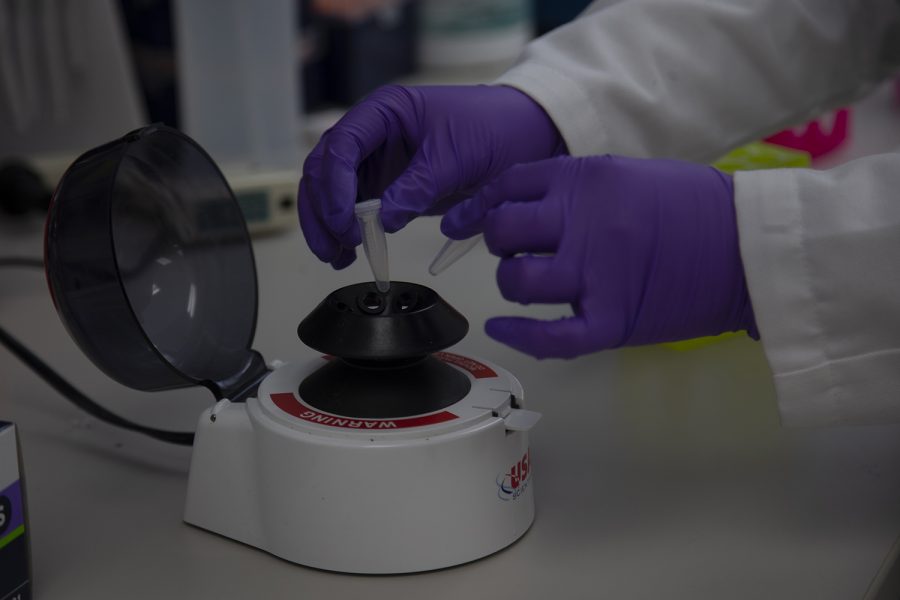UI researchers find potential link between DNA changes and suicidal behavior
Finding changes in gene pathways may help psychiatrists determine who has an elevated risk of suicide attempts.
Test tubes with samples are put into a spinner at the University of Iowa Medical Laboratory on Wednesday, Sept. 25, 2019.
September 27, 2019
With a grant from the American Foundation for Suicide Prevention, University of Iowa researchers will continue their studies of creating genetic profiles of individuals with psychiatric disorders to better understand who has a high risk for suicidal behavior.
Associate Professor of Psychiatry Virginia Willour said researchers are particularly interested in subjects with bipolar disorder.
“Eighty percent [of bipolar patients] in our studies think about killing themselves, and 40 percent try to kill themselves,” Willour said. “There is evidence to believe that errors in DNA are in part to account for [the results].”
Willour said researchers will compile data from the genome sequencing of more than 30,000 subjects to create genetic risk profiles.
“It requires pretty remarkable international cooperation,” she said of working with sample sizes of that magnitude. “… We’re going to try as many different genetic approaches as we can, because we believe we are going to learn something of value from them.”
The research will look at specific genes to track their changes and how they affect suicidal tendencies.
“[What] we are particularly interested in are the [genes] involved in serotonin production, because there is prior evidence of them being involved in suicidal behavior,” Willour said.
The research team will also look for changes in gene expressions from medications used to treat bipolar disorder such as lithium, Willour said.
She said that an important insight for the research stemmed from a former graduate student of hers, Eric Monson.
“One of the things we think about that other people don’t necessarily think about is that there may be differences between men and women [affecting suicidal behavior],” Willour said.
RELATED: Labs from UI, Texas share credit for simultaneous genetic discovery
People previously believed that discrepancies in suicide statistics between men and women connected to firearm access, Willour said, but some genetic evidence suggests otherwise.
Monson, now at the University of Utah, said he had prior experience in studying psychiatric disorders such as schizophrenia, but he was intrigued by the idea of researching bipolar disorder.
“It’s a disorder I feel that hasn’t been investigated very thoroughly, especially compared to other disorders,” Monson said. “It has the highest risk of suicide among all psychiatric disorders.”
Monson said the process is still in the early stages, but some of the identification process was successful in part because of Monson’s dissertation. He found that those who attempted suicide were more likely to have damaged gene pathways connected to metabolization of toxins such as alcohol.
Monson said there isn’t an established way to determine right now if particular DNA strains have higher risks of suicide besides what can be determined by asking patients questions.
“Suicide is such a tragic loss … by its nature it’s inherently preventable,” Monson said.
Monson said the stigma attached to suicide makes it an uncomfortable subject for research. However, some programs such as the Kognito At-Risk training work to make it a more approachable topic.
RELATED: Monthly interest group delves into DNA
University Counseling Services Director Barry Schreier said the program is unique and interactive.
“It’s now part of ICON so every first-year and transfer incoming student is going to be required to take it, so within four years everyone on this campus will have taken the Kognito training,” Schreier said.
Schreier said the program was brought back with a secure funding base by support from his department, UI Housing & Dining, and UI Student Government.
The Daily Iowan reported in March that UISG passed legislation to raise the student mental-health fee by $2 above the original $12.50. UISG also allocated $5,000 to pay the integration fees for Kognito into Success at Iowa programming for first-year students.
UISG funds helped cover the cost to integrate the program into MyUI and ICON web services. A $90,000 three-year contract with Housing & Dining helped fund the remaining costs, according to the UISG legislation.
“For the student body, it becomes part of the working culture of the campus — a campus culture of care that we take suicide prevention so seriously that we require this as part of your onboarding to the university,” Schreier said.





















